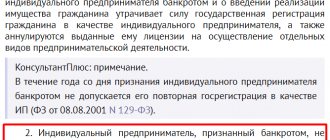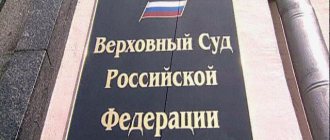REMOVAL OF THE COMPETITION MANAGER
| The material was prepared by Law Firm Logos lawyer Evgeniy Ivanov |
The figure of the bankruptcy trustee plays a key role in the bankruptcy procedure in case of bankruptcy of an enterprise. According to Part 3 of Art. 129 of the Federal Law “On Insolvency (Bankruptcy)” dated October 26, 2002 No. 126-FZ (hereinafter referred to as the Bankruptcy Law), the bankruptcy trustee has the right, among other things, to dispose of the debtor’s property in the manner and on the conditions established, to dismiss the debtor’s employees , including the head of the debtor, in the manner and under the conditions established by federal law, declare refusal to execute contracts and other transactions in the manner established by Article 102 of the Bankruptcy Law. It is obvious that such broad powers can be used in different ways, including to the detriment of the interests of bankruptcy creditors. In order to prevent such situations, Article 145 of the Bankruptcy Law provides for the possibility of removing the bankruptcy trustee from performing his duties.
According to this norm, the bankruptcy trustee may be removed
from the performance of duties
by the arbitration court 1)
on the basis of a petition from a meeting of creditors (committee of creditors) in the event of non-fulfillment or
improper fulfillment of the duties assigned to the bankruptcy trustee
;
2)
in connection with the satisfaction by the arbitration court of a complaint of a person participating in a bankruptcy case about the failure or improper performance by the bankruptcy manager of the duties assigned to him, provided that such failure or improper performance of duties violated the rights or legitimate interests of the complainant, and also entailed or could entail losses for the debtor or his creditors.
3)
if circumstances are identified that prevented the person from being approved by the bankruptcy manager, as well as if such circumstances arose after the person was approved by the bankruptcy manager.
The Presidium of the Supreme Arbitration Court in Information Letter No. 150 dated May 22, 2012 “Review of the practice of consideration by arbitration courts of disputes related to the removal of bankruptcy trustees” gave recommendations on the application of Art. 145 of the Bankruptcy Law.
Based on the explanations given by the Supreme Arbitration Court of the Russian Federation and examples of judicial practice, attention should be paid to the following features of the procedure for removing a bankruptcy trustee:
1.
When submitting a corresponding petition to the meeting of creditors (committee of creditors). First of all, the decision of the creditors' committee and the corresponding petition filed by the creditors' committee is an independent basis for the removal of the bankruptcy trustee, even in the absence of a decision of the creditors' meeting on this issue. Such instructions were given by the Presidium of the Supreme Arbitration Court of the Russian Federation in paragraph 3 of the said Information Letter.
In addition, the Presidium of the Supreme Arbitration Court of the Russian Federation clarified that the minutes of the meeting of creditors (creditors’ committee) do not necessarily have to reflect specific violations committed by the bankruptcy manager, since, as the Presidium of the Supreme Arbitration Court of the Russian Federation indicated, the corresponding petition of the meeting of creditors is only a reason for considering the issue of such removal, The court, due to its control function in a bankruptcy case, when considering this issue is not bound (not limited) by specific violations reflected in the minutes of the meeting of creditors.
However, examples of judicial practice that took place almost simultaneously with the publication of the said Information Letter by the Presidium of the Supreme Arbitration Court of the Russian Federation indicate that the courts do not always share this approach. Thus, the Federal Arbitration Court of the North-Western District, in its Resolution dated May 16, 2012 in case No. A56-24067/2005, refusing to satisfy the petition of the creditors’ meeting to remove the bankruptcy trustee, referred to the fact that the minutes of the creditors’ meeting at which the decision was made about filing such a petition does not contain information about the grounds on which such a decision was made.
Regarding other requirements for a petition to remove a bankruptcy trustee
, then here we pay attention to the Determination of the Arbitration Court of St. Petersburg and the Leningrad Region dated September 7, 2012 in case No. A56-11178/2010. Leaving without consideration the petition of one of the bankruptcy creditors, the court pointed to the following circumstances: the petition was filed with reference to the fact that its submitter, the bankruptcy creditor, is a legal entity acting as a representative of the meeting of creditors, at the same time, from the provisions of Article 2, paragraph. 1 tbsp. 35, paragraph 4, art. 36, paragraph 1, art. 145 of the Bankruptcy Law it follows that an individual who acts on behalf of the meeting of creditors solely on the basis of the minutes of the meeting of creditors and cannot transfer his powers can be chosen as a representative of the meeting of creditors. Since in the situation under consideration a legal entity was elected as a representative of the meeting of creditors, the court considered that the petition for removal was signed by an unauthorized person, which is grounds for leaving it without consideration.
It should also be noted that the courts, applying the provisions of Art. 145 of the Bankruptcy Law indicate that the removal of a bankruptcy trustee is a right, and not an obligation of the court, even if the corresponding petition is filed on behalf of a meeting of creditors - see the Resolution of the Federal Arbitration Court of the North-Western District dated May 16, 2012 in the case No. A56-24607/2005.
2.
If the arbitration court satisfies the complaint of a person participating in a bankruptcy case about the failure or improper performance by the bankruptcy trustee of the duties assigned to him. Explaining the procedure for applying this basis for the removal of a bankruptcy trustee, the Presidium of the Supreme Arbitration Court of the Russian Federation indicated in paragraph 2 that it does not follow from paragraph three of paragraph 1 of Article 145 of the Bankruptcy Law that the complaint and the petition for removal should be considered separately. On the contrary, the content of this norm indicates that both the issue of satisfying the complaint and the issue of dismissal can be considered in one court hearing.
This provision of the Bankruptcy Law provides that a person participating in a bankruptcy case can file a complaint and petition for the removal of a bankruptcy trustee. The list of such persons is determined by part 1 of Article 34 of the Bankruptcy Law, which refers to the following: the debtor, the arbitration manager, bankruptcy creditors, authorized bodies, federal executive bodies, as well as executive bodies of the constituent entities of the Russian Federation and local government bodies at the location of the debtor in cases provided for by this Bankruptcy Law, as well as the person who provided security for financial rehabilitation.
The courts are expanding the list of persons who can file a complaint against the bankruptcy trustee and a petition for his removal, also including other persons participating in the bankruptcy arbitration process, whose rights and legitimate interests are violated by the actions of the bankruptcy trustee - see the Resolution of the Federal Arbitration Court Northwestern District dated September 24, 2012 in case No. A56-70676/2009. As on the previously discussed grounds, when a bankruptcy creditor or other person participating in a bankruptcy case files a complaint against the actions of the bankruptcy trustee, his removal is a right and not an obligation of the court - Resolution of the Federal Arbitration Court of the East Siberian District dated May 10, 2012 in case No. A19-3380/09.
Speaking about the meaning of the provisions of Art. 145 of the Bankruptcy Law, the courts indicate that the basis for satisfying a creditor’s complaint about the violation of his rights and legitimate interests by the actions (inaction) of the arbitration manager is the establishment by the arbitration court of the facts of non-compliance of these actions (inaction) with the Law and violation of the rights and legitimate interests of the debtor’s creditors by such actions. At the same time, the removal of the bankruptcy trustee should be used to the extent that it makes it possible to restore violated rights or eliminate the threat of their violation, and be applied when the bankruptcy trustee has shown his inability to properly conduct bankruptcy proceedings, which is manifested in improper performance of duties. Violations committed by the bankruptcy trustee may become the basis for his removal if there are reasonable doubts about his further proper conduct of bankruptcy proceedings (Resolution of the Federal Arbitration Court of the North-Western District of October 2, 2012 in case No. A56-70723/2010).
The significant difference between this basis and the cases when the issue of removing the bankruptcy trustee is decided on the basis of an application from the meeting of creditors is that when the meeting of creditors makes a corresponding petition, the presence or possibility of causing losses is not a necessary condition for the removal of the bankruptcy trustee - this was indicated by The Presidium of the Supreme Arbitration Court of the Russian Federation in paragraph 9 of the above-mentioned Information Letter.
On the other hand, if a bankruptcy creditor or another person participating in the bankruptcy case applies for the removal of the bankruptcy trustee, then a necessary condition for the satisfaction of such a petition is a violation of the rights and legitimate interests of the applicant, as well as the infliction or possibility of causing losses to the debtor by the actions (inaction) of the bankruptcy trustee or his creditors. If the violations committed by the bankruptcy trustee are such that they did not and could not lead to losses on the part of the debtor or his creditors and did not violate the rights and interests of the applicant, the petition for the removal of the bankruptcy trustee shall not be granted. This position was expressed by the Presidium of the Supreme Arbitration Court of the Russian Federation in paragraph 7 of Information Letter No. 150 of May 22, 2012, and is applied by the courts when considering similar cases. So, for example, in case A19-3380/2009, the request to remove the bankruptcy trustee was rejected with reference to the fact that, despite the fact that the fact that the bankruptcy trustee had failed to comply with the requirements of the Bankruptcy Law was revealed, there was evidence of causing losses or possible causing of losses the debtor or his creditors are not present in the case.
3.
If circumstances are identified that prevented the person from being approved by the bankruptcy manager, as well as if such circumstances arose after the person was approved by the bankruptcy manager. The list of circumstances that prevent a person from being confirmed as a bankruptcy trustee contains clause 2 of Art. 20.2 of the Bankruptcy Law.
In particular, the following arbitration managers cannot be approved as bankruptcy trustees in a bankruptcy case:
- who are interested parties in relation to the debtor and creditors;
- who have not fully compensated for the losses caused to the debtor, creditors or other persons as a result of non-fulfillment or improper fulfillment of the duties assigned to the arbitration manager in previously conducted procedures applied in the bankruptcy case, and the fact of which was established by a court decision that has entered into legal force;
— in respect of which the procedures applied in a bankruptcy case have been introduced;
- who are disqualified or deprived in the manner established by federal law of the right to occupy leadership positions and (or) carry out professional activities regulated in accordance with federal laws;
- who do not have liability insurance contracts concluded in accordance with the requirements of the Bankruptcy Law in case of losses to persons participating in the bankruptcy case;
- who do not have access to state secrets in the established form, if the presence of such access is a mandatory condition for the approval of the arbitration manager by the arbitration court.
The question of the possibility of applying one or another basis is resolved by the court, taking into account the circumstances of a particular case. Thus, in the framework of case A73-6489/2011, the tax authority demanded the removal of the bankruptcy trustee
based on his interest, since previously the manager served as chairman of the debtor’s liquidation commission. This request was denied on the grounds that the fact that a person was appointed chairman of the liquidation commission of the company does not indicate his interest in relation to the debtor, and therefore does not prevent his approval as the bankruptcy trustee of this company (Resolution of the Federal Arbitration Court of the Far Eastern District dated June 26 2012 No. F03-2400/2012).
As for the procedural features of considering the issue of removing the bankruptcy trustee on this basis, it should be noted that this issue can be considered by the court even in the absence of a corresponding petition from the persons participating in the case, or from a meeting (committee) of creditors. This position is set out by the Presidium of the Supreme Arbitration Court of the Russian Federation in paragraph 5 of the already mentioned Information Letter No. 150 dated May 22, 2012.
FAQ
If you still have questions, then maybe you will find answers to them in this section...
What is the percentage of successful lawsuits to remove insolvency practitioners?
It is no secret that not every creditor manages to remove the arbitration manager.
In most cases, the reasons for failure lie in the fact that the wrong tactics were initially chosen.
Therefore, it is advisable to understand your options for removing the arbitration manager while on shore, because it will be difficult to return to a working relationship later.
What to do if the percentage of votes is not sufficient for the meeting of creditors to make a decision on removal?
It is the majority of votes at the meeting of creditors that is an important factor in determining whether the removal of the arbitration manager will bring the desired result.
I also recommend reading this article
The DIA has identified over 20 thousand cases of deposit fraud
The largest case of fraud was Express Bank with an amount of 7 billion rubles. Shortly before the license was revoked, about 11 thousand fictitious entries were made into its electronic database about the placement of deposits through the cash desk in amounts close to the insurance indemnity limit. MOSCOW, March 21
Continue reading
After all, half the battle is to remove the arbitration manager - you still need to appoint another, and for this you just need a majority of votes at the meeting of creditors.
If there is no majority vote at the meeting of creditors, then the complaint will rather have the function of monitoring the activities of the insolvency administrator.








